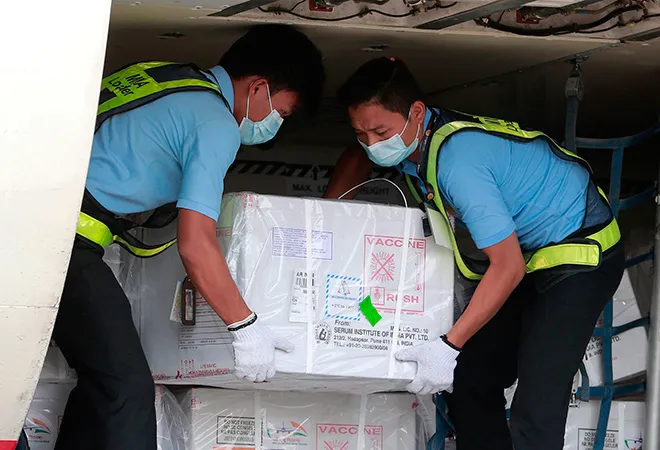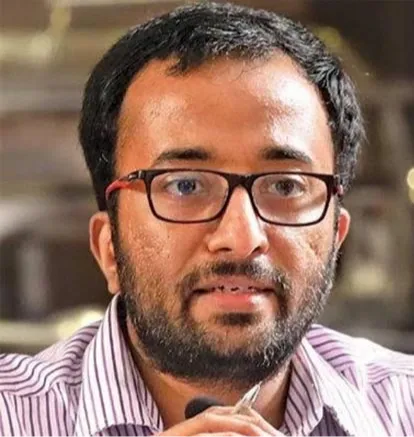The biggest vaccination campaign ever has also brought the focus on health inequalities at a global scale. As of 21st January, of the more than 55 million Covid-19 vaccine shots administered across the world, only 55 doses have gone to people of a low-income country. That country is Guinea, and they have secured these 55 doses “on an experimental basis” from Russia to vaccinate the country’s senior leadership including the President.
As the rich countries skip queue to deal directly with the vaccine manufacturers, mopping up limited supplies and driving up prices in the process, they also trigger fears that the poor countries of the world will have to wait for months if not years to get the required number of vaccine doses. The situation has forced the director-general of the World Health Organisation (WHO) to announce that the world is on the brink of a catastrophic moral failure.
India, on the other hand, has emerged as one of the first lower-middle-income countries in the world to start vaccinating its people, well ahead of many richer countries in Asia. India is the only lower-middle-income country among the global top 15 in terms of vaccine doses administered. This could be achieved due to the countries enormous vaccine manufacturing capacity built over decades. Indeed, India is a traditional vaccine superpower, contributing more than half of all the vaccines that the United Nation agencies distribute across the world.
India has emerged as one of the first lower-middle-income countries in the world to start vaccinating its people, well ahead of many richer countries in Asia. India is the only lower-middle-income country among the global top 15 in terms of vaccine doses administered
Given the human cost India suffered, there is enormous pressure on the Government of India to quickly vaccinate as many Indians as possible. However, in an admirable display of moral courage, India has decided to consider people across the border as its own and prioritise high risk populations across the border ahead of low-risk populations within the country. Interestingly, there seems to be a consensus on the issue with no significant opposition to vaccine exports from across the political spectrum.
As an emerging leader in a world where traditional powers increasingly act in self-interest, this is a significant achievement for India given its complex and often chaotic political processes. Through its meticulously planned vaccine rollout, India is making sure that there are no regional disparities within the country, and in addition, it is also making sure its other countries are getting Indian vaccines in parallel.
Responding to requests following Prime Minister Modi’s declaration of commitment to use India’s vaccine production and delivery capacity to help all of humanity fight the pandemic, India is supplying vaccines under grant assistance to Bhutan, Maldives, Bangladesh, Nepal, Myanmar and Seychelles. According to official sources, vaccine supplies to Sri Lanka, Afghanistan and Mauritius are awaiting regulatory clearances in respective countries. In addition, Indian companies including Serum Institute and Bharat Biotech are finalising contracts with South Africa, Brazil, and some Middle-eastern countries, among others.
This would mean that in these countries and many others that India will help, Indian vaccine supplies will reach before those from the COVAX facility hosted by the WHO to improve access to Covid-19 vaccines in poorer countries. Success of COVAX too will depend to a large extent on vaccine supplies from India. According to reports, the initiative is struggling to secure supplies due to competition from richer countries, and vaccine deliveries to member countries will start only in February. Meanwhile, many countries in the region have already received vaccine consignments from India, with sarv santu niramaya (may all be free from disease) emblazoned on them. That is a prayer from the Upanishads, and the guiding principle of India’s Ayushman Bharat.
Government of India’s vaccine internationalism is in perfect alignment to its role as a major global player during the pandemic, supplying medicines like Hydroxychloroquine, Remdesivir, and Paracetamol, as well as diagnostic kits, ventilators, masks, gloves and other supplies to the world. During a time when American vaccine diplomacy is missing on the global scene with China moving quickly to fill that gap – Pakistan just became the first country in South Asia to approve a Chinese vaccine- India needs to balance equity and strategy considerations in parallel.
During a time when American vaccine diplomacy is missing on the global scene with China moving quickly to fill that gap – Pakistan just became the first country in South Asia to approve a Chinese vaccine- India needs to balance equity and strategy considerations in parallel.
Given America’s transformation as a ‘lone-wolf’ superpower over the past few years, and the ‘me-first’ world of global distribution of Covid-19 vaccines heavily dominated by vaccine nationalism of the rich countries, how India continues to strike that balance would, in many ways, define the future of global health as well as a multipolar world.
A shorter version of this essay appeared in The Economic Times
The views expressed above belong to the author(s). ORF research and analyses now available on Telegram! Click here to access our curated content — blogs, longforms and interviews.




 PREV
PREV


